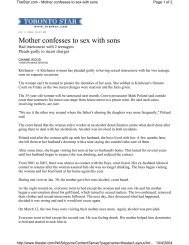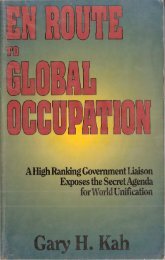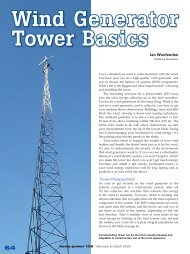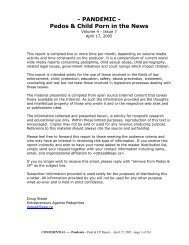G. Edward Griffin - The Fearful Master - PDF Archive
G. Edward Griffin - The Fearful Master - PDF Archive
G. Edward Griffin - The Fearful Master - PDF Archive
Create successful ePaper yourself
Turn your PDF publications into a flip-book with our unique Google optimized e-Paper software.
PART III<br />
PSYCHOLOGICAL WARFARE<br />
United Nations Capture of the American Mind<br />
On a dark scene in a dark time of troubles, New York's guest, the UN is proclaiming, by<br />
deed as well as word, that men can live not by violence and brute strength, but, at last, by<br />
reason and law.<br />
Adlai Stevenson, March 2, 1961<br />
CHAPTER ELEVEN: ANIMAL FARM<br />
Some years ago George Orwell wrote a brilliant satire on twentieth-century collectivism<br />
entitled Animal Farm. It is the story of a revolution staged by the animals on Farmer<br />
Jones's place. <strong>The</strong> animals considered themselves workers being exploited by nonproductive<br />
humans--the capitalists. <strong>The</strong>y reasoned that once the entire farm was turned<br />
over to the workers they would all live better and not have to work so hard.<br />
As with all revolutions, there were leaders and there were followers--mostly the latter. On<br />
Animal Farm, the leadership was cheerfully provided by the pigs who hastened to point<br />
out that they were, through no fault of the others, a little smarter than the rest.<br />
One of the first official acts of the new regime was to draft a statement of seven great<br />
principles which were then painted on the back wall of the barn for all to see. <strong>The</strong>se<br />
principles became the basis of the new order and were designed to protect the animals<br />
from any future injustice or infringement on their rights. <strong>The</strong>re were such noble<br />
pronouncements as, "No animal shall drink alcoholic beverages"; "No animal shall sleep in<br />
a bed"; and "No animal shall kill another animal." But the greatest and wisest of all was the<br />
seventh great principle which read: "All animals are equal."<br />
As the months slowly turned into years, however, things did not turn out quite the way the<br />
"workers" had expected. <strong>The</strong>y were working twice as hard and eating half as well as they<br />
had when they were "exploited" by Farmer Jones. <strong>The</strong> one significant exception, of<br />
course, was the ruling clique of pigs who were now living very well indeed. In fact they had<br />
moved right into Jones's house where they had been seen drinking Jones's ale and<br />
sleeping in Jones's bed! When the puzzled workers went to the rear of the barn to see if<br />
there was not something in the seven great principles prohibiting this kind of conduct, they<br />
found that a few changes bad been made: "No animal shall drink alcoholic beverages . . .<br />
to excess"; "No animal shall sleep in a bed . . . with sheets." Even the important sixth<br />
principle now read, "No animal shall kill another animal . . . without cause." But by far the<br />
worst shock came when the poor creatures turned with hope to the seventh and greatest<br />
of all the principles, which now declared, "All animals are equal . . . but some animals are<br />
more equal than others"!<br />
In this allegory, Orwell has exposed one of the universal devices of demagoguery--the use<br />
of high-sounding phrases to appeal to the noble aspirations of well-intentioned but<br />
unenlightened followers. It has been used with success from the very beginning of<br />
recorded history. But the device has been expanded and refined during recent years to<br />
the point where it is now perhaps the most important single item in the Communist bag of


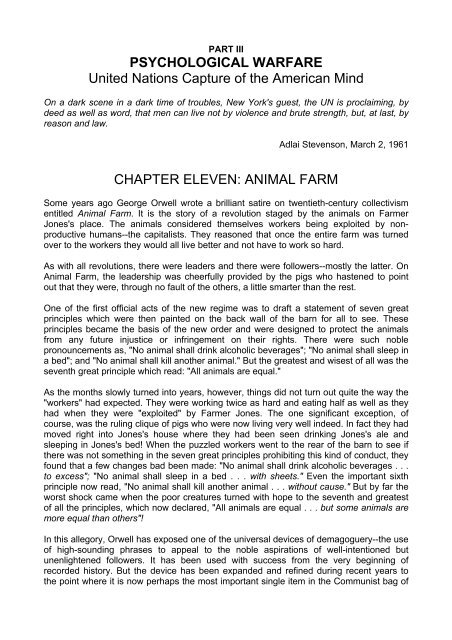
![Robert T McQuaid [rtmq@stn.net] Sent: Friday, October 29, 2004 12 ...](https://img.yumpu.com/51070071/1/190x245/robert-t-mcquaid-rtmqstnnet-sent-friday-october-29-2004-12-.jpg?quality=85)



